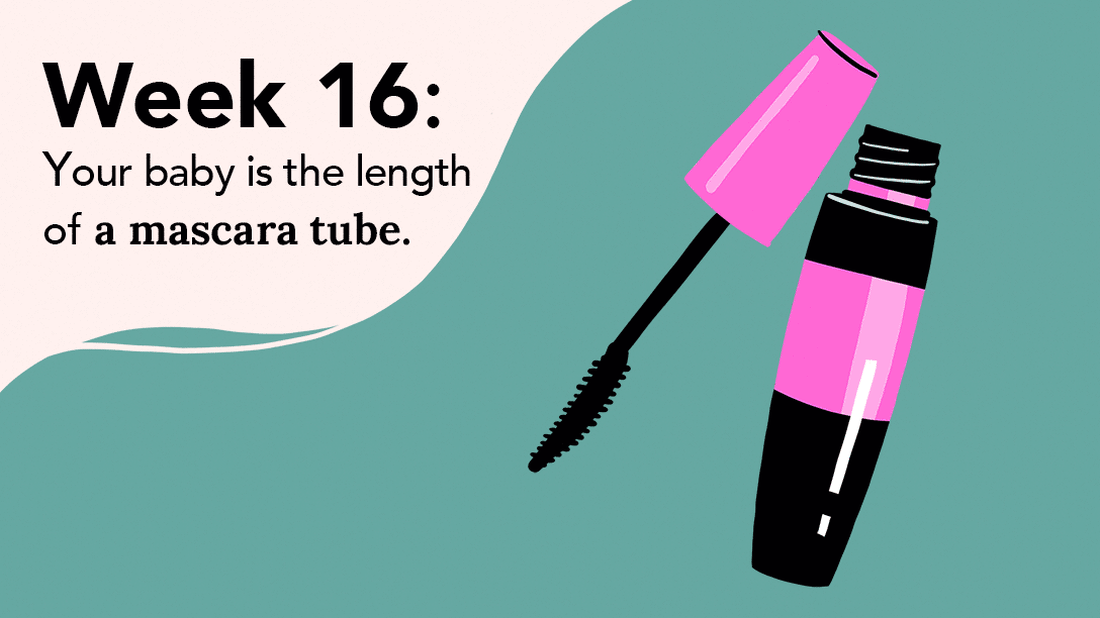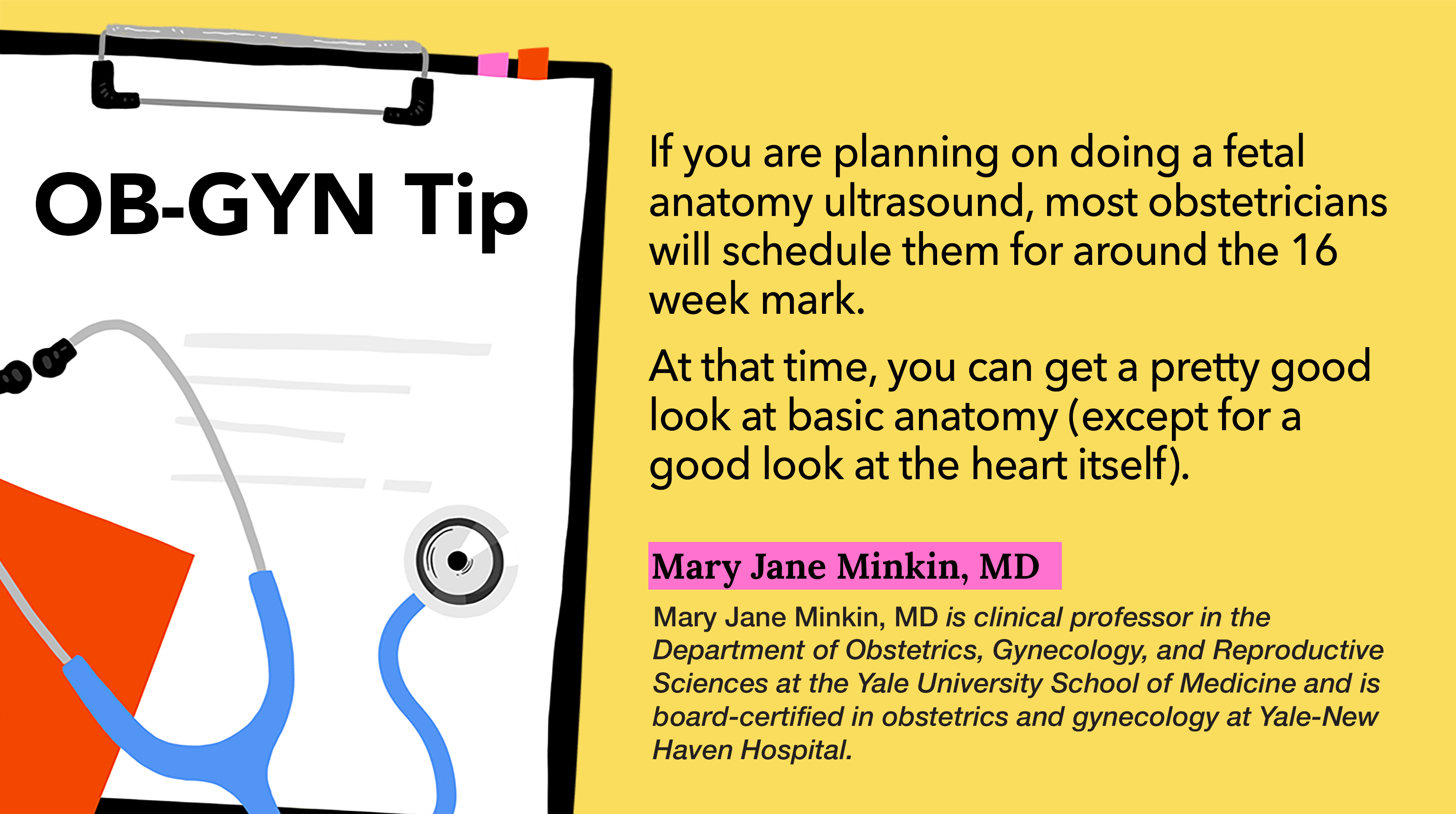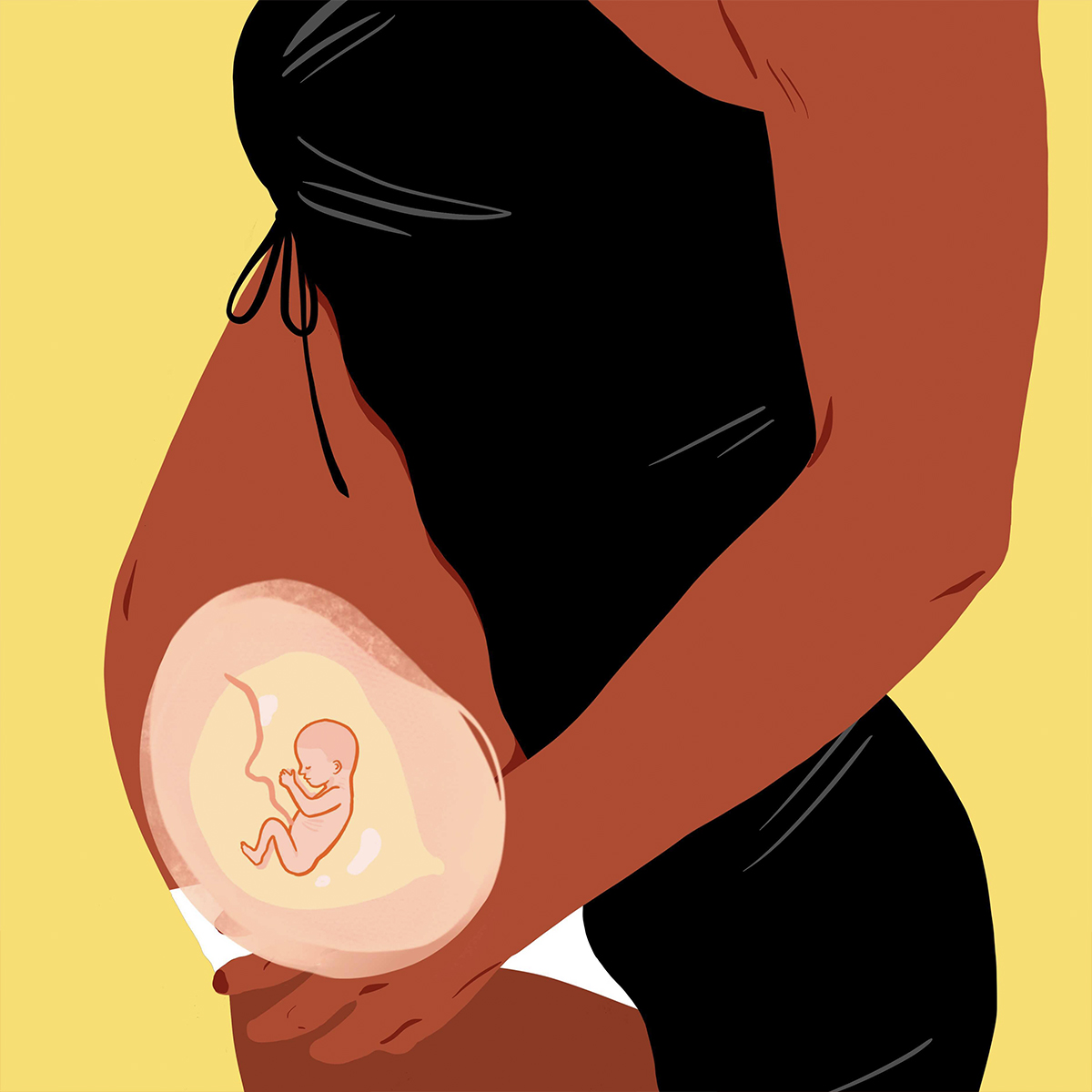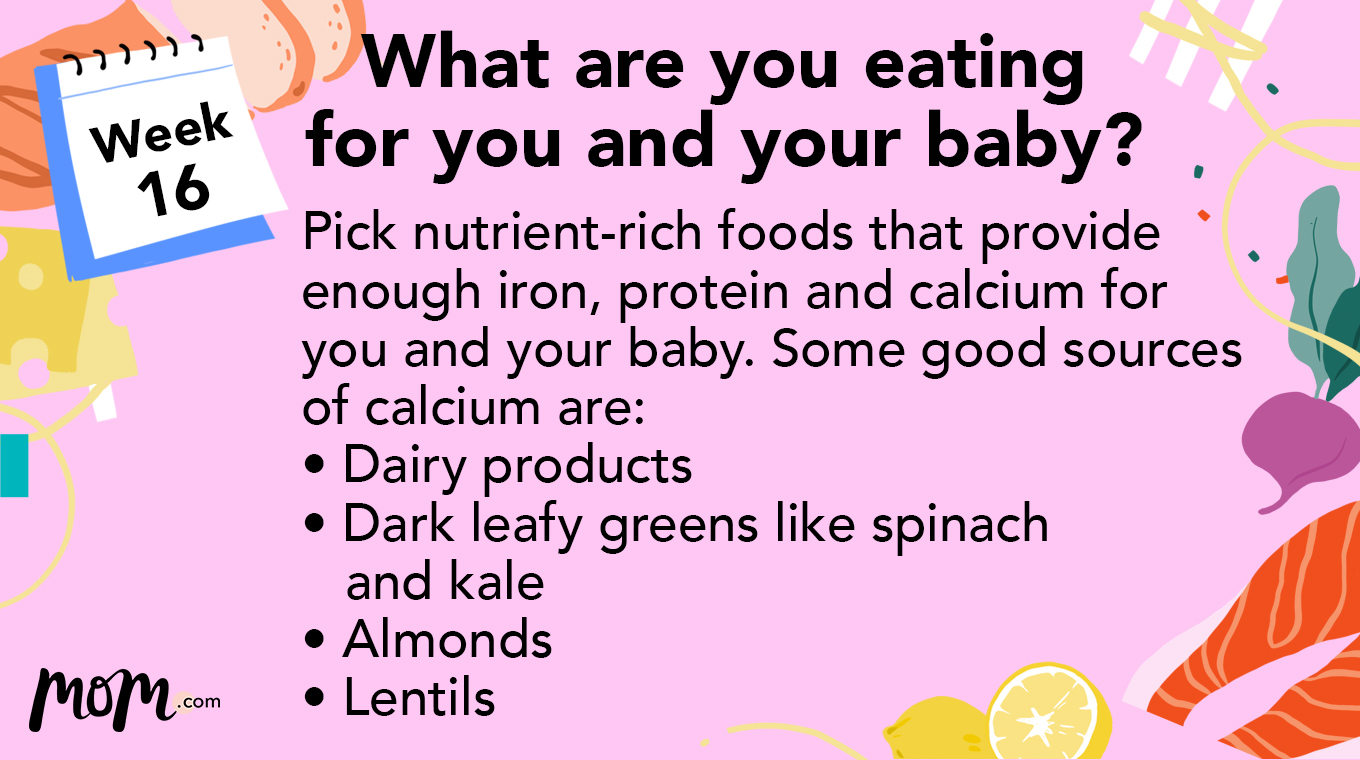
In this article
You’re 16 weeks pregnant!
Congratulations! You’ve survived your first 16 weeks and things are about to get a little more interesting. You may have another prenatal exam where you can hear your baby’s heartbeat and more exciting than that — you may start feeling your baby kick at any moment! Babies tend to kick more after you eat so if you haven’t felt it yet, pay attention after a meal to see if they’re more active than normal. Later in the pregnancy, your doctor may have you count kicks to everyday to make sure that your baby is developing well.
Additionally, your baby can start hearing your voice and they’ll even recognize it at birth. Don’t worry about talking to your baby — though some people recommend doing so — your baby will hear your voice through your daily living and recognize it just fine. And even if they don’t — they’ll have plenty of time to get used to it once they’re born.

Pregnancy symptoms at 16 weeks
At 16 weeks, your energy levels — and sex drive — will most likely have increased since your first trimester. But don’t worry if that hasn’t happened yet. There is a wide range of normal and unless it severely affects your ability to live your daily life, there is no need to consult a physician. Every person and pregnancy is different.
Here are some signs of pregnancy at 16 weeks:
Nasal congestion or nosebleeds
When you’re pregnant, not only does your uterus swell because of all the pregnancy hormones, so can your nasal membranes. As a result, you have increased chances of either nasal congestion or nosebleeds. Both are relatively harmless (though annoying). It’s nothing to worry about unless the bleeding is excessively heavy.
Though your congestion may worsen as your pregnancy progresses, your doctor might not be able to prescribe antihistamine nasal sprays or decongestants. But you can try saline sprays, nasal strips, a humidifier, or dabbing some petroleum jelly in your nostrils to prevent dryness and see if any of these more natural solutions can help.
Bleeding gums
Again, thanks to the aforementioned hormonal induced swelling, your gums are also more sensitive to the bacteria present in tooth plaque. Thus, 50% of women will have gums that swell, become red and tender, or bleed after flossing or tooth brushing.
Growing breasts and breast tenderness
Just like everything in your body, your breasts are also swelling and getting bigger! Not only will there be increased blood flow to your breast tissue, your breasts are building up fat, tissue, and milk glands to prepare for breastfeeding.
Constipation
These same pregnancy hormones slow down your gastrointestinal tract, and combined with your expanding uterus pressuring your bowels, it’s no wonder you’re constipated. Consider drinking more water, eating more fiber, and trying probiotics (as long as your doctor approves).
Increased vaginal discharge
Vaginal discharge is your body’s way of protecting your birth canal — and thus your baby — from infection. Even though it may cause discomfort, avoid douches or feminine wipes because they can irritate your genital tract, leading to possible infections.
Varicose veins
Again, due to the increased blood supply and swelling from pregnancy hormones, the blood vessels in your legs may swell. To minimize varicose veins — which can often hurt — try to gain weight gradually because the extra weight can increase the burden on your circulatory system.
What does 16 weeks equal in months?
At 16 weeks pregnant, you’re in your fourth month of pregnancy and second trimester. Here’s what pregnancy weeks equal to in months for the second trimester:
- Month 4: Weeks 14 to 17
- Month 5: Weeks 18 to 22
- Month 6: Weeks 23 to 27
Your ultrasound
At 16 weeks pregnant, most doctors won’t schedule an ultrasound since they typically follow the American College of Obstetricians and Gynecologists (ACOG) recommendation of getting at least one ultrasound around 18 to 22 weeks. If you require an amniocentesis, those are usually scheduled around 15 to 20 weeks. During the procedure, the medical professional will also conduct an ultrasound to check on your baby’s health and development. This allows them to get better data on your fetus’s gestational age, check for certain genetic disorders, and listen to the fetal heartbeat.
Your pregnant belly at 16 weeks

At 16 weeks, your baby is typically around 4.5 inches long, weighs about 3.5 ounces and is about the size of a pint of ice cream. Because your uterus is developing at around the same rate as your baby, you likely can no longer hide your pregnant belly. As a result, you might also be gaining more weight than you are normally accustomed to.
Again, don’t worry! Your size and weight will vary even from pregnancy to pregnancy. All that matters is that you and your baby are getting the nutrients they need from the foods and supplements you’re eating.
Your baby can now straighten out their head and neck more due to the spine and back muscles gaining strength. Their face muscles are also developing and now your baby can frown or squint and make some facial expressions. Plus, their eyes are finally working and can shift side-to-side as well as sense light through their sealed eyelids.
Pregnancy tips at 16 weeks
At 16 weeks pregnant, you may want to do the following for yourself:
Schedule an amniocentesis
The amniocentesis is usually scheduled around 15 to 20 weeks and is used to determine the health of your baby. Plus, the procedure can be used to diagnose specific birth defects or chromosomal anomalies. Generally offered to people who are 35 or older at the time of pregnancy, it can also be recommended for people who may need additional genetic assessments.
Check with your doctor about preeclampsia
Ask your doctor if you are at higher risk for preeclampsia. Developing in later pregnancy (typically after week 20), preeclampsia is characterized by a sudden spike in blood pressure. Not only may you have high blood pressure, you may have severe hand and face swelling, terrible headaches, protein in your urine, and abdominal pain. Find out if your doctor would recommend a daily dose of low-dose aspirin to reduce your risk of preeclampsia.
Take care of your skin and potential acne
The combination of hormones as well as possible extra oil production from your skin can lead to acne and flare-ups. Choose oil-free or more gentle products that may have glycolic acid or benzoyl peroxide. Avoid products with retinol, and always consult with your physician before trying anything.
Your pregnancy checklist at 16 weeks
Once the second trimester begins, you will be at the OB/GYN every four weeks so make sure you schedule those visits ahead of time.
Schedule prenatal testing
Within the next four weeks, you’ll likely take a blood test to help screen for Down syndrome as well as schedule an amniocentesis. The amniocentesis tests a small sample of amniotic fluid withdrawn by an ultrasound guided needle. Whether or not you need these tests depends on your prenatal care provider and your general age and health.
What are you eating for you and your baby?

Your appetite at 16 weeks pregnant may be picking up so that you can provide the calories your baby needs to grow and develop properly. You’ll need approximately another 300 to 340 calories per day to provide the nutrients and calories for your growing baby so choose good calories. Pick nutrient-rich foods like hearty soups, and go for leafy greens and lean protein that benefit both you and your developing fetus.
Iron
“Eat lean red meats, leafy green vegetables, whole grain breads, dried fruits and beans,” recommended Lizellen La Follette, M.D., OB-GYN at Marin General Hospital in Greenbrae, Calif. Your blood volume increases during pregnancy and as a result, your body will need additional iron. Pregnant women are also at higher risk for anemia, so if you find yourself constantly fatigued, weak, short of breath, have pale or yellowish skin, chest pain, dizziness, or cold hands and feet, your OB/GYN may suggest having your iron levels tested.
Protein
You should be eating approximately 1.52 grams of protein per kilogram you weigh. Protein contributes to fetal brain development as well as other fetal tissues. Some excellent sources of protein are:
- Nuts
- Tofu
- Eggs
- Lean meats
- Cooked fish
- Lentils, beans, and peas
Calcium
Eat calcium rich foods found in dairy products, dark leafy greens like spinach and kale, almonds, and lentils. Eat calcium rich foods in conjunction with foods high in Vitamin D like salmon, egg yolks, and herring or sardines to help your body better absorb the calcium.
In addition, try to avoid or restrict the following foods:
- Caffeine, alcohol, and drugs
- Undercooked meats
- Unheated lunch meats
- Unpasteurized foods (e.g.: soft cheeses)
- Unwashed fruits and vegetables
- High mercury seafoods
- Raw seafood (e.g.: sushi)
- Raw eggs
When to call your doctor
If you are bleeding, spotting, and experiencing pelvic or abdominal cramping, please contact your medical practitioner immediately. Your hormones also affect your emotional state so you may also require additional mental and emotional support. If you experience depression, excessive stress, or anxiety, reach out to a professional for help.
According to the Centers for Disease Control and Prevention (CDC), pregnant women are at a higher risk of severe illness from COVID-19 and death compared to non-pregnant people. Furthermore, pregnant women with COVID-19 are at increased risk of delivering a baby before 37 weeks (preterm birth) and other adverse ramifications.
Note: If you are visiting a mental health professional or medical professional during COVID, make sure to ask about the facility’s safety measures and confirm that they are following COVID protocols as indicated by the CDC.
Additional considerations
Generally by 16 weeks pregnant, you know if you are having twins or multiples. At this point in your pregnancy, your symptoms won’t be markedly different from a person carrying only one baby. However, definitely inform your medical practitioner if you have symptoms that concern you since twin pregnancies are considered higher risk.
Additionally, while most people get an amniocentesis done if they are 35 years or older (barring other circumstances), in the case of twins or multiples, your doctor may recommend that you get the procedure done if you are over 33 years old.
Ask your doctor about the increased risks of cesarean births — though in some cases, twins are delivered vaginally. The factors that contribute to the likelihood of cesarean births are:
- Number of babies — as well their individual position, weight, and health
- Your general health and how your labor is progressing
- Your OB/GYN’s experience
If you have previously experienced postpartum depression (PPD) or depression, please consult with your physician on your risk levels for PPD with twins or multiples since having multiples increases the odds of developing PPD. Please consult with a mental health professional if you are experiencing intense feelings of anxiety, sadness, or despair — especially if they prevent you from living your daily life.






